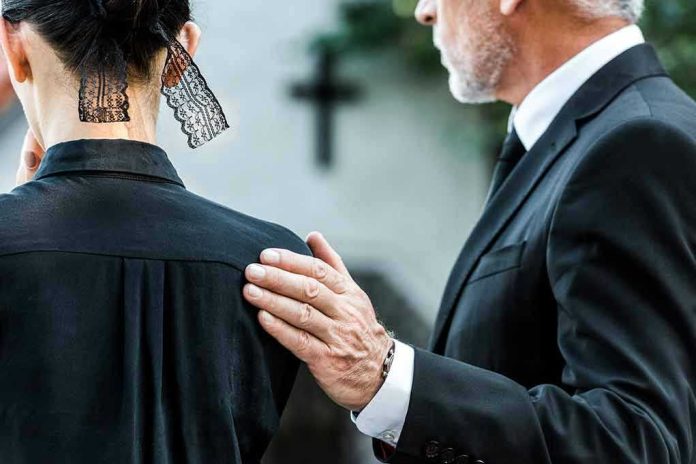
Trust in the sanctity of final farewells shattered when a funeral director admitted to 35 fraud charges involving human remains, including four unborn babies—exposing a level of betrayal and ethical collapse that few imagined possible.
Story Snapshot
- A funeral director pleaded guilty to 35 fraud charges tied to mishandling human remains, including four unborn babies.
- The case highlights deep ethical and legal failures within the funeral industry.
- Families of the deceased faced profound trauma and loss of trust in essential services.
- Calls for stricter regulation and oversight of funeral practices have intensified.
Betrayal of Trust: The Core of the Scandal
When families entrust funeral directors with their loved ones, they expect dignity, respect, and honesty. The recent guilty plea by a funeral director to 35 fraud charges, spanning the mishandling of human remains and including four unborn babies, upended that fundamental trust. This is not merely a story of criminality; it is a tale of profound ethical collapse at the heart of an industry built on compassion. The scale and nature of the offenses—reaching even the most vulnerable—have left a trail of anguish. The community’s faith in funeral services, already fragile from past scandals, now faces its most serious test yet.
Families who sought closure were instead delivered fresh wounds. Funeral directors are licensed professionals charged not just with the logistics of burial or cremation, but with upholding the final rites that give meaning to loss. When this sacred trust is violated, the consequences are not only legal, but deeply personal. The pain is compounded for those who learned that even the remains of unborn children were subject to deception and neglect. Such revelations ripple outward, shaking confidence in every corner of the industry.
Industry Under Scrutiny: History and Context
Funeral scandals are not new. Decades of regulatory loopholes and isolated abuses have haunted the industry’s reputation. From body brokering to mishandling of remains, each incident chips away at public trust. Despite increased scrutiny and periodic regulatory reforms, the sector remains vulnerable to exploitation by those who see opportunity in oversight gaps. This case, distinguished by the inclusion of unborn children among the victims, signals not just criminality, but a moral failing that demands systemic change. Regulatory agencies now find themselves under pressure to enforce stricter oversight, and lawmakers are fielding calls for reform from a public unwilling to tolerate further betrayal.
A former funeral director has admitted 35 counts of false representation and one count of fraudulent trading in relation to funeral plans. He pleaded not guilty to 30 counts of preventing the lawful and decent burial of a body, and one count of theft. @Jack_Carson reports pic.twitter.com/Tt8bKHzZzY
— GB News (@GBNEWS) October 15, 2025
Law enforcement agencies responded with a thorough investigation, leading to a raft of charges and a subsequent guilty plea. Yet, the real work may only be beginning. The industry faces a reckoning: how to restore integrity and guarantee that such violations cannot recur. For many, the hope is that this prosecution serves as a deterrent and a catalyst for meaningful reform, rather than a solitary cautionary tale.
Ripple Effects and Calls for Reform
Short-term consequences have been swift. The funeral director faces sentencing, and affected families may find some measure of legal closure. Yet, the long-term implications for the funeral industry are more profound. Every operator, from small-town establishments to corporate chains, now operates under a cloud of suspicion. Regulatory bodies are conducting reviews, and some have announced intentions to tighten licensing requirements and increase surprise inspections. Professional associations are emphasizing ethics training, hoping to forestall further damage to their collective reputation.
Public trust, once lost, is difficult to regain. For grieving families, the assurance that their loved ones will be treated with dignity is not a luxury—it is a necessity. Many industry insiders now argue that only radical transparency and rigorous external oversight can begin to repair the breach. The stakes are more than financial or reputational; they touch on the basic human need for closure and respect in the face of mortality.
Expert Perspectives: Ethics and Oversight
Industry experts and ethicists find common ground in their analysis: stronger regulation and oversight are imperative. Some scholars contend that the funeral industry’s unique position—operating at the intersection of commerce and sacred trust—makes it particularly susceptible to abuse when left unchecked. Academic commentary emphasizes the need for a robust ethical framework, enforced not just through punitive measures but through a culture of accountability and transparency. While some see this case as an isolated aberration, others warn that without systemic reform, it is only a matter of time before another scandal emerges.
The most pressing question now is whether this latest breach will spark a wave of substantive change or fade, leaving families and the public to wonder whether their trust is ever truly safe. The answer will shape not only the future of funeral services, but the way society navigates the most vulnerable moments of life and death.
Sources:
Funeral director admits 35 charges and denies others — BBC News
Ex-funeral director admits fraud charges after bodies — Yahoo News
Funeral director admits giving women ashes he claimed were unborn children — The Westmorland Gazette

